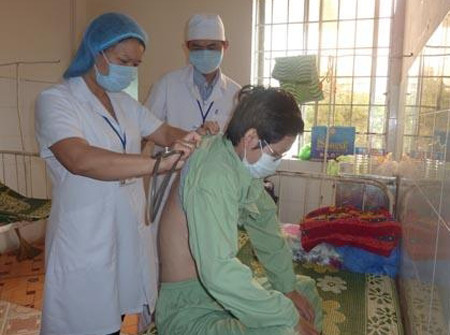Vietnam is a country with a high rate of antibiotic resistance in the world.
Mr. Nguyen Viet Tien, Deputy Minister of Health emphasized this at the 2016 Antimicrobial Resistance Communication Rally in Vietnam organized by the Hanoi People's Committee in coordination with the Ministry of Health, Ministry of Industry and Trade, Ministry of Agriculture and Rural Development, Ministry of Natural Resources and Environment; World Health Organization, Food and Agriculture Organization of the United Nations and international organizations in Vietnam on November 30, in Hanoi.
Speaking at the ceremony, Deputy Minister of Health Nguyen Viet Tien said that the invention of antibiotics not only has great benefits in treating and caring for patients but is also used in livestock, poultry, aquaculture and crop farming to treat and prevent animal diseases, as well as for production purposes. Along with this, there has also been a rise in antibiotic resistance in bacteria. Antibiotic resistance is not a new problem, but it is extremely serious, requiring a concerted effort to help humanity avoid the risk of returning to a time before antibiotics.
Currently, drug resistance is a global problem, especially prominent in developing countries, including Vietnam. Every year, hundreds of thousands of people die from drug resistance and hundreds of billions of dollars are spent on drug resistance. "It is alarming that multidrug-resistant bacteria have appeared in Vietnam, and the level of resistance is increasing, especially in gram-negative bacteria, often appearing in hospitals with genetically modified bacteria that are multiresistant to new generation carbapenems. The World Health Organization ranks Vietnam among the countries with high antibiotic resistance rates in the world," Mr. Nguyen Viet Tien emphasized.
 |
| Deputy Minister of Health Nguyen Viet Tien spoke at the ceremony. |
According to Mr. Luong Ngoc Khue, Director of the Department of Medical Examination and Treatment Management (Ministry of Health), in the world, especially in developing countries, the problem of drug resistance has become alarming. Most medical examination and treatment facilities are facing the rapid spread of bacteria resistant to many types of antibiotics. The level and speed of drug resistance are increasing, at an alarming level. In 2011, globally there were about 64,000 cases of multidrug-resistant tuberculosis (MDR - TB).
The burden of antibiotic resistance is increasing due to increased treatment costs, prolonged treatment days, affecting the health of patients, the community and the overall development of society. Every year, millions of people die from antibiotic resistance, including 1.4 million children, and hundreds of billions of dollars are spent on antibiotic resistance, according to the 2013 World Crisis report, with each country losing an average of 0.4-1.6% of its national GDP to prevent and combat antibiotic resistance. The World Health Organization (WHO) stated that we are living in an era of antibiotic dependence and requires global responsibility to protect precious antibiotic resources for future generations.
In the prevention and treatment of tuberculosis, according to WHO assessment, in Vietnam, the tuberculosis epidemic is still complicated. In 2015, Vietnam still ranked 12th among 22 countries with high number of tuberculosis patients and ranked 14th among 27 countries with high burden of multidrug-resistant tuberculosis. The rate of multidrug-resistant tuberculosis is 2.7% among new tuberculosis patients (about 4,800 patients) and accounts for 19% among tuberculosis patients undergoing re-treatment (about 3,400 patients).
 |
| Illustration photo. |
The current situation of antibiotic resistance is due to the limited awareness of the community and health workers about antibiotics and antibiotic resistance, the use of antibiotics even when not prescribed; the arbitrary use of antibiotics without a doctor's prescription, and people can arbitrarily buy antibiotics at pharmacies.
Many pharmacists sell drugs in violation of regulations; because doctors prescribe antibiotics, prescribe inappropriate antibiotics, or abuse expensive, new-generation antibiotics; because the widespread, prolonged use of antibiotics in livestock, poultry, and aquaculture to treat and prevent animal diseases, as well as for growth stimulation purposes, has caused microorganisms to adapt to drugs, creating conditions for many types of bacteria to become resistant to drugs, making drugs less effective or ineffective.
At the ceremony, Deputy Minister of Health Nguyen Viet Tien called on every health worker, citizen and the entire community to commit to using antibiotics responsibly. Each citizen only buys and uses antibiotics when examined and prescribed by a doctor and uses antibiotics according to the doctor's instructions. Farmers use antibiotics in raising livestock, poultry and aquatic products according to the instructions of veterinary staff. Health workers strictly follow professional instructions and use antibiotics in treatment appropriately and safely.
According to qdnd.vn
| RELATED NEWS |
|---|
